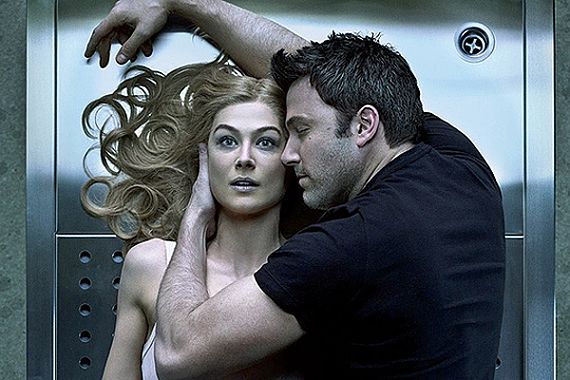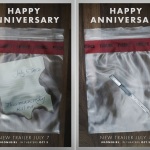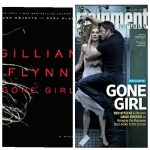“Hell hath no fury like a woman scorned”
As other reviews have pointed out, you can only really watch or read Gone Girl once without having a very coloured view of the outcome. Up to then the twists and turns of this thriller about a very dark relationship are a genuine mystery, so it isn’t hard to spot why the book became an instant best seller. The movie, as movies do, diverts the book outcomes, one motive being perhaps to prevent the déjà vu characterisation and encourage viewers to see both as separate entities.
No such problem for me, since I never read the book. However, I was equally interested in what the film has to say about modern relationships, since there is unquestionably a dark subtext to Gone Girl, dealing with dishonesty – though not just on the part of the male partner. We’ve all heard tales about bunny-boiling women and abusive men, but Gone Girl has a much more cunning way to deceive our expectations. Author Gillian Flynn (hard “G”) says this of her work:
“Marriage is sort of like a long con, because you put on display your very best self during courtship, yet at the same time the person you marry is supposed to love you warts and all. But your spouse never sees those warts really until you get deeper into the marriage and let yourself unwind a bit.”
The reality is relationships can be intensely complex, subtle, shocking – and far more than just face value. Just how well do we know our partners, and what is our capacity for forgiveness once we find those warts? In this case the tolerance levels between Nick (Ben Affleck) and Amy (Rosamund Pike, whom I once saw on the London stage in Hitchcock Blonde) have been worn away long before their 5th anniversary.
They are helped by the choice of director. If you wanted someone to depict the unravelling and the complexity beneath surface level you could do a lot worse than David Fincher. In my scribblings here I have posted reviews of several of Fincher’s works, including Zodiac, Benjamin Button, the remake of The Girl With The Dragon Tattoo, Social Network and Se7en. In each case you can sense the key element being an attempt to understand the motivation of complex, albeit very different characters and in some cases the interaction between characters, what brings them together and what tears them apart.
Like a few before it, this is a movie that dares to go to places the majority of movies steer well clear of, and the darkest of those is what goes on behind closed doors in the psychology of a marriage. In this case it is spiralling towards infidelity, complacency and antipathy, not necessarily in that order. This marriage has become a game of deceit, infidelity, lies and revenge, descending roughly in parallel with the fall in the American economy.
The starting point to this tale is that Amy has vanished, and circumstantial evidence points towards Nick having murdered her – but there is much more to it, told through a good many flashbacks. Nick has to defend himself but also to delve into their history to uncover the truth, which arrives in the nick of time and from the least likely source. He chooses a flashy attorney, Tanner Bolt, played with panache by Tyler Perry.
As the song says, you always hate the one you love, the one you shouldn’t hurt at all, and both parties have contributed to the caustic decline of what was once a loving relationship – and another cliché applies too: it takes two to tango, and ultimately it’s a tale about the depths to which they will sink in order to take out their frustrated passion upon one another. The perversity of relationships, you might say, since you wonder at times why people do stay as couples, yet they often manage to raise children and become happier with age.
Perhaps in tackling the subject of the forces upon a marriage, Fincher has reached the apogee of his career – beyond which everything will seem like childs’ play. By force of nature, much of the communication has to be implied on screen, to be created by body language, by gesture and by what is not said – and also what is hidden as part of the conjuring trick presented in several plot twists and turns, each tableau lasting nearly long enough to induce some element of discomfort, and in at least one case complete revulsion.
That said, he does also have Flynn’s scalpel sharp, waspishly witty and fluently literate script to aid the process, perhaps in some way an evolution down the road to hell and eternal damnation from Edward Albee‘s game-playing George and Martha in Who’s Afraid of Virginia Woolf – one of several comparisons to other works that could be levelled.
Unlike Albee, Flynn’s script also stabs deep into the black and cynical heart of American broadcast media, though the lawyer actually comes out of this surprisingly well. It also lays a trail of clues, but even these are not what they seem and cannot be trusted. With the possible exception of Nick’s decent and honourable sister Margo (Carrie Coons), everybody and everything on view has something to hide.
In this context, how far you can rely on words and gestures to convey meaning in these circumstances depends on how far the actors get beneath the skin, and here I felt that in hellishly difficult circumstances both do a brilliant job. Perhaps Affleck takes the biscuit, by virtue of the slightly slow-witted, naive writer who could not believe his wife capable of deceit, such that the truth dawns on him gradually and with the sudden realisation that he is impotent to do anything to stop it: this time he is the victim and was maybe three steps behind his wife throughout.
This is not to detract from Pike’s performance, for it is unmistakably a tour de force, revealing a steely will as she peels back the many layers of the intellectually superior ‘Amazing Amy’. Don’t be fooled by appearances – dumb blonde she ain’t! She fakes rape and… much worse. There is one very bloody scene.
In fact, let’s go the whole hog: Gone Girl is an inky black tale, steeped in rich irony and mordant humour, one that plays with our expectations at every level and never lets up, despite it’s steady pacing over two-and-a-half hours screen time. Maybe the manipulation is essential to genre, since the film at least masquerades as a thriller, and could conceivably be viewed solely within that genre were it not for a pungent legacy that will keep you thinking and revising for some time after the viewing and to make all but the most superficial think about their own relationships.
In that case, here’s another hypothesis: Gone Girl is a cunning modern update of the Medieval tradition of Morality Plays, though the moral may be a tad murky for some tastes. What is the nature of marriage? A bargain struck but never one to stay static, for things change. It makes you wonder how well you truly know another person and how far you can really trust them. The answers to Flynn’s questions appear to be: not as much as you think, so caveat emptor? .
So to the verdict: Definitely a film to be seen, though it is what you make of it – a glittering prize to admire more than enjoy, though there is one hell of a lot within it worthy of admiration. And the woman scorned? Watch out for her!













